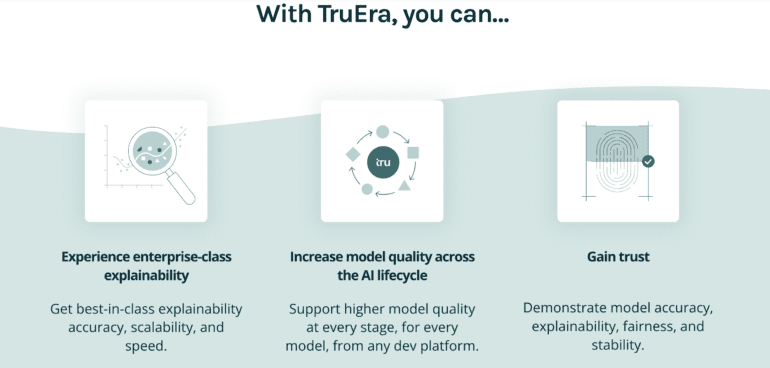TL;DR:
- TruEra has launched TruLens for LLM Applications, an open-source testing software for apps built on Large Language Models (LLMs).
- LLMs are emerging as a key technology but have raised concerns about hallucinations, inaccuracies, toxicity, bias, safety, and misuse.
- TruLens addresses two major pain points: slow experiment iteration and inadequate testing methods.
- It introduces feedback functions to evaluate LLM applications at scale, improving efficiency and effectiveness.
- TruLens helps AI developers enhance LLM usage, reduce toxicity, evaluate information retrieval, flag biased language, and understand API usage costs.
- Feedback functions assess truthfulness, relevance, harmful/toxic language, sentiment, language mismatch, response verbosity, fairness, bias, and custom functions.
- TruLens enables developers to build high-performing applications and fill a gap in the LLMOps tech stack.
Main AI News:
TruEra, a leading provider of software solutions for ML model testing and monitoring throughout the MLOPs lifecycle, has unveiled TruLens for LLM Applications, an innovative open-source testing software designed specifically for apps leveraging Large Language Models (LLMs) such as GPT. With the growing prominence of LLMs as a pivotal technology poised to power a wide range of applications in the near future, concerns surrounding their utilization have also been on the rise. Prominent news stories highlighting LLM hallucinations, inaccuracies, toxicity, bias, safety issues, and potential for misuse have underscored the need for robust testing and validation mechanisms.
TruLens effectively addresses two critical pain points that plague LLM app development today. Firstly, it streamlines the process of experiment iteration and champion selection, which has historically been sluggish and arduous. Building LLM applications necessitates extensive experimentation. Following the initial development of an app, developers engage in manual testing and review, continually adjusting prompts, hyperparameters, and models and undergoing repeated testing until achieving a satisfactory outcome. This iterative process often presents challenges, with the ultimate winner not always apparent.
Secondly, existing testing methods have proven to be inadequate, resource-intensive, and time-consuming. Testing tools for LLM apps have largely relied on direct human feedback as the primary evaluation method. While valuable as an initial step, gathering direct human feedback can be sluggish, inconsistent, and difficult to scale effectively. TruLens introduces a groundbreaking approach known as feedback functions, enabling teams to evaluate, iterate upon, and enhance their LLM-powered apps swiftly. By leveraging this programmatic approach, TruLens empowers organizations to conduct comprehensive evaluations of LLM applications at scale.
Anupam Datta, Co-founder, President, and Chief Scientist at TruEra, elaborated on the capabilities of TruLens: “TruLens feedback functions assess the output of an LLM application by analyzing the generated text and associated metadata. Through modeling this relationship, we can systematically apply it to evaluate models at scale.” This innovative methodology revolutionizes the evaluation process, offering developers a powerful tool to expedite experiment iteration and make informed decisions.
TruLens for LLMs provides invaluable assistance to AI developers in several key areas:
- Enhancing the effectiveness of LLM utilization for their applications.
- Mitigating the potential social harm and “toxicity” often associated with LLM-generated results.
- Evaluating the performance of information retrieval within their applications.
- Identifying and flagging biased language present in application responses.
- Understanding the financial implications of their application’s LLM API usage.
Furthermore, TruLens incorporates a comprehensive set of feedback functions capable of evaluating various aspects, including truthfulness, question-answering relevance, harmful or toxic language, user sentiment, language mismatch, response verbosity, fairness, bias, and even custom feedback functions tailored to specific requirements.
Datta emphasized the significance of TruLens for developers: “LLM-based applications are gaining traction and will only continue to proliferate. TruLens empowers developers to build high-performing applications and expedite their time to market. By validating the effectiveness of LLMs within their specific use cases and mitigating potential adverse effects, TruLens fills a crucial gap within the emerging LLMOps technology stack.”
Conlcusion:
The launch of TruLens for LLM Applications by TruEra represents a significant development in the market for applications leveraging Large Language Models (LLMs). This open-source testing software addresses critical pain points related to experiment iteration and testing methods, providing businesses with an efficient and effective solution. By enabling developers to evaluate and enhance LLM-powered applications at scale, TruLens empowers organizations to build high-performing applications, mitigate potential risks, and deliver robust solutions to market faster.
This advancement fills a crucial gap in the emerging LLMOps technology stack, paving the way for increased adoption and confidence in LLM-based applications. As a result, businesses can leverage the power of LLMs with greater assurance, leading to improved outcomes, reduced risks, and enhanced customer experiences in the evolving landscape of language model applications.

